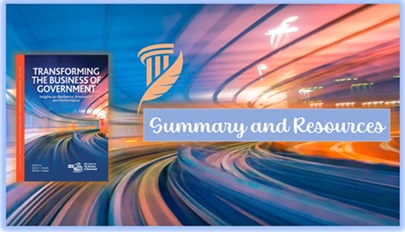
New Book: Transforming the Business of Government -- Summary and Resources

Over the last two months, we initiated a series posting each chapter of our latest book, Transforming the Business of Government: Insights on Resiliency, Innovation, and Performance (https://bit.ly/3Nss2Tw) on this site. The purpose was to share the insights found in the book and get them into the hands and minds of as wide an audience as possible. This book commemorates the 25th anniversary of The IBM Center for The Business of Government. Over the last quarter-century of connecting research to practice, we have benefited greatly from collaborating with partners, through various networks and ecosystems, who also find value in improving the management and operation of government.
The insights and recommendations outlined in this book have been 25 years in the making. We’ve drawn on the Center’s extensive library of over 451 reports, 800 radio show interviews with government leaders and influencers as well as the convening of many roundtables with thought leaders, experts, and government executives who want to make a difference in shaping the future of government that can best serve the people. While we cannot acknowledge everyone for their inspiration, support, and ideas across the years, we would like to thank those who have worked with the IBM Center in contributing to the ideas presented here. To help government leaders build capabilities and resilience to prepare for future shocks, we launched an initiative in collaboration with the IBM Institute for Business Value (IBV) and the National Academy for Public Administration that developed content found in the first six chapters of this book. We will continue the Future Shocks initiative capturing case studies of resiliency in action. The last nine chapters of this book would not have been possible without the thoughtful contributions of our 25th Anniversary Challenge Grant winners. We continue supporting the work of academics and thought leaders focused on improving and transforming the business and operations of government through our biannual research funding process with the next proposal submission deadline March 1, 2024.
Summary and Resources
Insights on Resiliency -- Resilience involves more than pushing through after adversity or disappointment— but rather, resilient organizations turn crisis into opportunity and discover value in the unexpected. Anticipating the future—getting ahead of events rather than being subsumed by them—becomes integral to positioning, resourcing, and preparing an agency for what may come, while always keeping focus on primary mission responsibilities. As outlined below, the chapters in Part I and II of this book offer insights and recommendations for government leaders and stakeholders on how best to discover value in the unexpected, and in doing so to more effectively position and lead organizations in the face of the unknown. Cascading, disruptive events have also raised fundamental questions about what capacities governments need to anticipate, prepare for, and respond to crises.
Chapter One - Emergency Preparedness and Response
Chapter Two - Cybersecurity
Chapter Three - Supply Chain
Chapter Four - Sustainability
Chapter Five - Workforce
Chapter Six - Eight Areas for Government Action - Insights on Resiliency
Insights on Innovation & Performance – The last nine chapters introduce compelling insights and timely perspectives from academics and practitioners on a variety of topics that can help governments address evolving future shocks and other scenarios. These chapters address larger themes of innovation and performance, to assist government leaders in efforts to enhance agency readiness. Each chapter outlines specific topics, capabilities, skills, technologies, and paths forward. The chapters encompass topics as diverse as AI, quantum computing, data and evidence, oversight, shared services, and customer experience.
Chapter Seven - AI Literacy: A Prerequisite for the Future of AI and Automation in Government
Chapter Eight - Design Principles for Responsible Use of AI to Enhance Customer Experience Using Public Procurement
Chapter Nine - Quantum Technology Challenge: What Role for the Government?
Chapter Ten - Using Linked Administrative Data to Advance Evidence-Based Policymaking
Chapter Eleven - Toward More Useful Federal Oversight
Chapter Twelve - Future of Payment Integrity within the U.S. Federal Government
Chapter Thirteen - Leveraging Inspectors General to Make Evidence-Based Decisions
Chapter Fourteen - A “One Agency” Approach to Enhanced Mission Enabling Services
Chapter Fifteen - Building and Maintaining Customer Trust in Government ServicesAs noted in our initial post, the 21st century so far has provided lessons on the power of the unexpected. Yet systems in place to meet anticipated problems have often fallen short in meeting novel challenges. Uncertainty remains constant, despite collective efforts to ameliorate the tension between ongoing operations and inevitable disruptions.
“Longing to reduce uncertainty and doubt has driven much of our progress. The more we noticed, remembered, wrote down, and shared, the more knowledgeable we became and the better we were to pass our learning on for future generations to increase" [Margaret Heffernan, Uncharted: How to Map the Future, Avid Reader Press]
With this disclaimer that no one can know for certain what may come next, the insights and recommendation detailed in this book provide a practical path forward in transforming the business of government.



